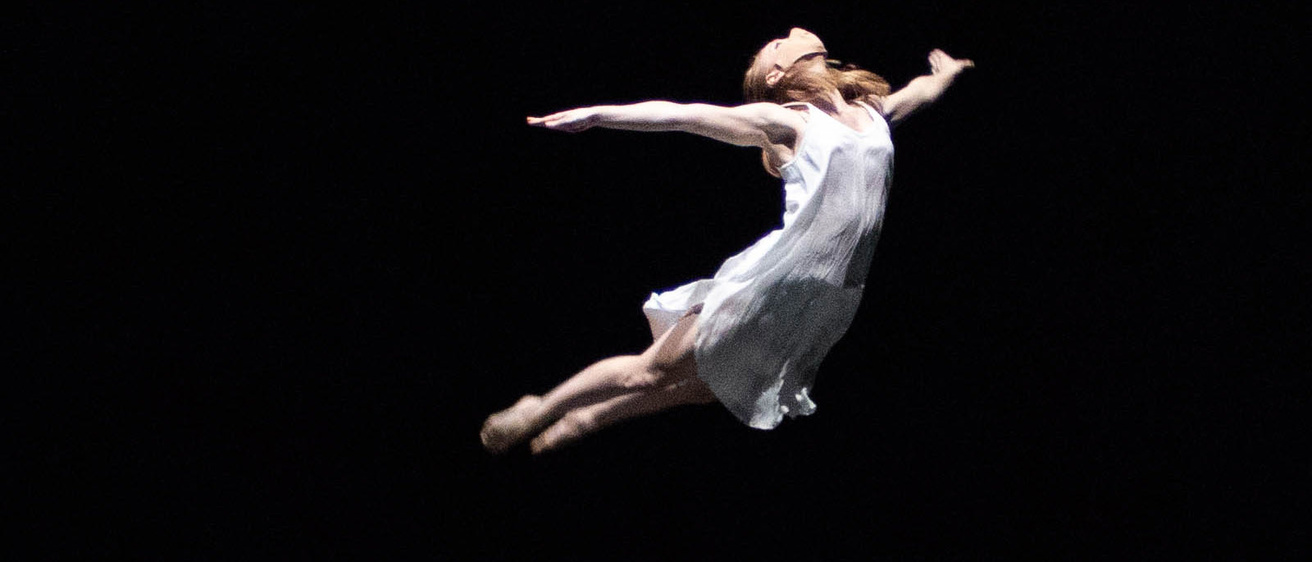After two years of virtual or limited presentations, Dance Gala will take the stage at Hancher Auditorium on November 11 and 12. The 2022 performance titled In Motion, presented by the Performing Arts at Iowa, features a diverse program with choreography by the Department of Dance that addresses heavy topics— like mental illness, coping, and community. It will also feature live musical performances by the School of Music, analog and virtual technology, and production assistance from the Performing Arts Production Unit.
Eloy Barragán is an associate professor in the Department of Dance and the artistic director for this year’s gala and choreographed the piece UNFINISHED, which he says is inspired by schizophrenia. His close friend, Michael Judge, had two brothers who suffered from the disorder, which can cause hallucinations, delusions, and extremely disordered thinking. One of the brothers ultimately died by suicide at just 21 years old.
“His experience moved me greatly,” Barragán explains. “As did the family’s perseverance and determination to advocate for the estimated 14.2 million others in the U.S. who suffer from serious mental illnesses like schizophrenia, bipolar disorder, and depression.”
Through the Judge family, Barragán also made a connection with MargaLea Warner, an Iowa Writers’ Workshop graduate and schizophrenia survivor who writes about her personal experience in her project 27 Keys to Wellness. Barragán says his choreography is a tribute to survivors like his friends, Warner and Judge, but also honors those who succumb to the illness, which, unfortunately, isn’t uncommon.
According to a study published by Columbia University in 2021, those with Schizophrenia have a 4.5-fold increased risk of dying by suicide, and those who are young and living with the condition have the highest risk.
"I’ve worked with many young dancers and have personally seen them struggle bravely with mental illness,” he says. “UNFINISHED is for all of them—those who are with us and those who aren’t—and every family ever touched by brain disorders like schizophrenia, bipolar disorder, and depression.”
Audiences can see UNFINISHED along with works by three more Department of Dance faculty members, professor Armando Duarte, associate professor Kristin Marrs, and assistant professor Stephanie Miracle. All of their performances explore through movement and technology the ways individuals can be bolstered by those around them during times of adversity, and how the community can celebrate its triumphs through the arts.
"Dance Gala is our marquee dance event of the year," says Rebekah Kowal professor and chair in the Department of Dance. "Not only does it feature innovative work from our faculty and guest choreographers, it provides a wonderful opportunity for students to perform on this big stage for our community, with the support of our incredible production team."
Another highlight of Dance Gala 2022 is a work by German-American dance duo FLOCK (Florian Lockner and Alice Klock), whose choreography is known for its non-binary partnering and unique approach to physicality and storytelling. FLOCK tours and performs their own original works in addition to choreographing for other dance companies, universities, and other cultural institutions.
Tickets for Dance Gala are available online through the Hancher Box Office. Performances will take place at Hancher Auditorium on Friday, Nov. 11, and Saturday, Nov. 12 at 8 p.m. It will also be available online on Sunday Nov. 13. To learn more, visit virtualdance.studio.uiowa.edu.
